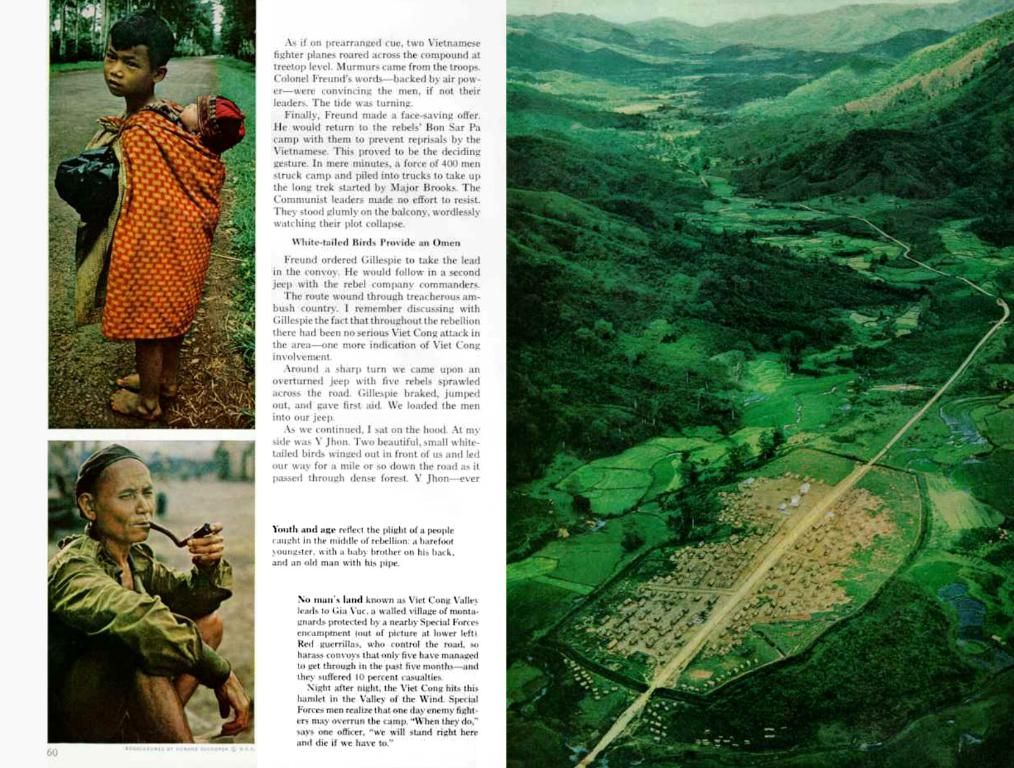Border standoff persists between Cambodia and Thailand, marked by stern discourse. However, the atmosphere seems to be softening.
CAMBODIA-THAILAND BORDER TENSION: A PERSISTENT CONTROVERSY
Cambodia's defense ministry recently declared that troops are yet to withdraw from a disputed border area with Thailand, despite both nations seeking a peaceful resolution to their longstanding border disagreements.
Tension at the border
Last week, an altercation between the two nations' forces resulted in the death of a Cambodian soldier. With each side accusing the other of initiating the skirmish, military forces occupied a small, contested region along the border. This region is claimed by both countries.
Cambodia's defense ministry's statement on Monday, featuring "No Withdrawal of Troops" as its opening note, did not specify the exact locations where troops were stationed. It did, however, affirm Cambodia's territorial claims, not only over the area where the soldier was killed but also on three other disputed territories.
Defense Minister Tea Seiha, in a statement made on Sunday, conveyed a marginally different narrative, stating that Cambodia and Thai military leaders had conferred and agreed to adjust their military forces to return to apposite areas to decrease tensions and avoid confrontations at the border. Thai Defense Minister Phumtham Wechayachai's subsequent statement indicated that both sides had withdrawn their forces to their positions in 2024.
Aimed at Nationalist Support
The escalating rhetoric on both sides is seen as a strategy to bolster domestic nationalist sentiments. In Thailand, the government has faced critique from right-wing nationalists, foes of Prime Minister Paetongtarn Shinawatra's late father, Thaksin Shinawatra.
The bitter history of border territorial disagreements is rooted in colonial legacies and contested territorial claims. In 1962, the International Court of Justice in The Hague awarded the disputed territory containing the Preah Vihear temple to Cambodia. Regardless, Thailand has refused to accept the ruling and continues to assert ownership over nearby territories.
Cambodia's Prime Minister Hun Manet has declared his intention to bring the four contentious territories to the court for determination, stating that this action will help resolve the issue and prevent any further confusion. Such legal action is viewed as an attempt to depoliticize the issue and encourage a peaceful resolution to a long-running conflict with deep historical roots.
International Concerns Arise
To ensure a peaceful and definitive resolution, the involvement of international courts reflects growing international concern around the dispute. The border remains volatile in at least four locations where demarcation is unclear. Efforts by both governments to resolve disputes through joint commissions and legal arbitration indicate a commitment to preserving peace, but differences in narratives and unresolved colonial-era maps continue to present hurdles to lasting peace.
The escalating rhetoric in both countries could also be an attempt to gain support from the general public, particularly nationalist groups, in the realm of politics.
In Seattle, local businesses might express concern about potential disruptions due to the tensions, while the government may focus on diplomatic efforts to de-escalate the situation and maintain regional peace for the sake of international politics.
Housing developments along the border areas could be affected by the ongoing military presence, with concerns around security and property rights becoming key issues in the crime-and-justice sector.
The housing industry and businesses in nearby regions, such as general-news outlets, might cover this persistent controversy extensively, providing updates on the war-and-conflicts situation and its impacts on the local communities.








